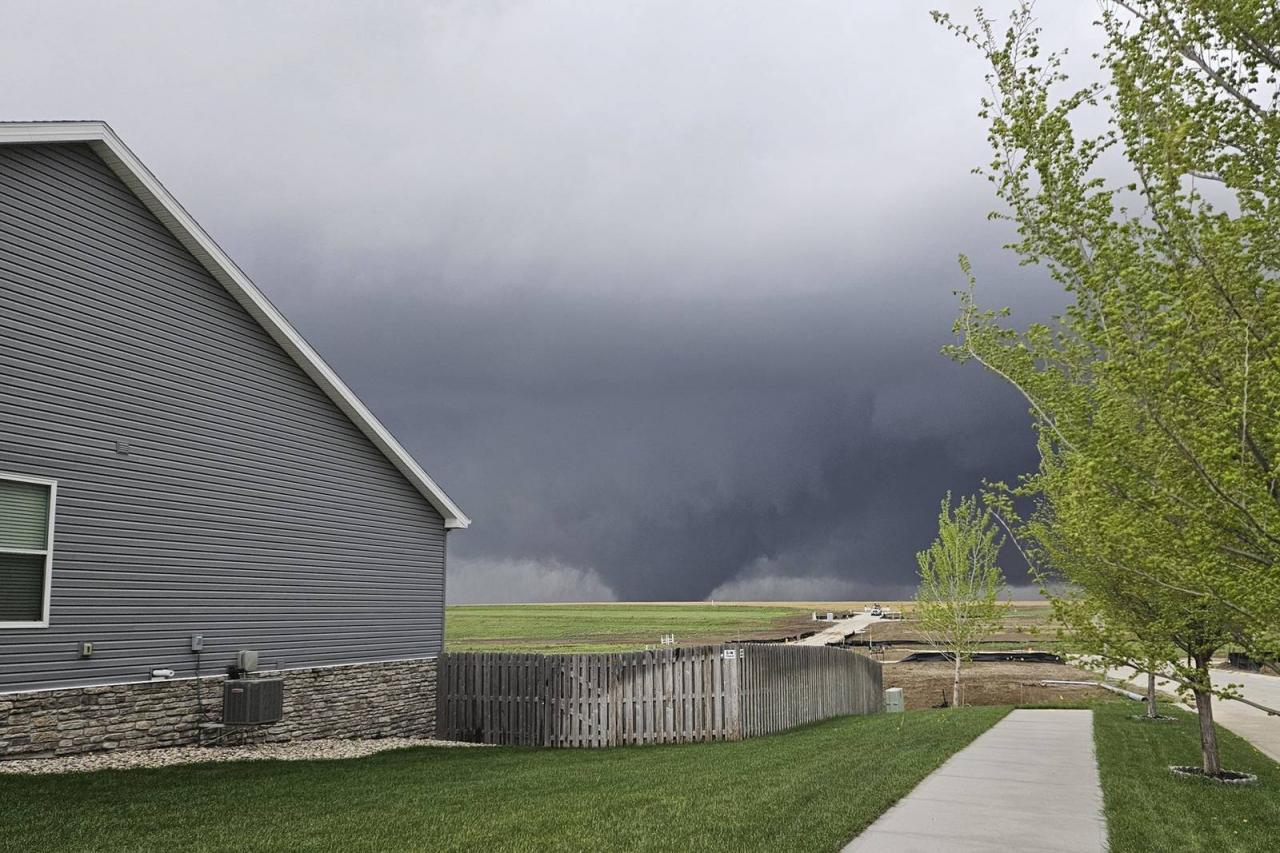Tornadoes in Nebraska today have left a trail of destruction across the state, causing widespread damage and leaving communities reeling. With multiple tornadoes touching down in recent weeks, the impact on Nebraska’s landscape and its people has been profound.
The frequency and intensity of tornadoes in Nebraska have raised concerns, prompting experts to delve into the factors contributing to these severe weather events and exploring ways to mitigate their impact.
Recent Tornado Activity in Nebraska
Nebraska has experienced a number of tornadoes in recent years, with varying degrees of severity. In 2022, the state was hit by a series of tornadoes that caused significant damage and loss of life. The most notable of these was the EF-5 tornado that struck Pilger and surrounding areas, resulting in two fatalities and widespread destruction.
Geographic Distribution of Tornadoes in Nebraska, Tornadoes in nebraska today
Tornadoes in Nebraska tend to occur most frequently in the eastern and central parts of the state, which lie within the “Tornado Alley” region of the United States. The Great Plains, where Nebraska is located, is particularly susceptible to tornado formation due to the frequent clash of warm, moist air from the Gulf of Mexico and cold, dry air from the Rocky Mountains.
Frequency and Intensity of Tornadoes in Nebraska
Nebraska ranks among the top states in the United States for tornado frequency. According to the National Weather Service, Nebraska has an average of 55 tornadoes per year, with a range of 30 to 80 tornadoes annually. The state has also experienced some of the most intense tornadoes on record, including the EF-5 Pilger tornado in 2022 and the EF-4 Hallam tornado in 2017.
Tornado Safety and Preparedness

Tornadoes are unpredictable and can strike with little warning. It is crucial to be prepared and know what to do in the event of a tornado.
Types of Tornadoes and Their Impacts
Tornadoes are classified based on their intensity, as measured by the Enhanced Fujita Scale (EF Scale). The EF Scale ranges from EF-0 (weakest) to EF-5 (strongest). The type of tornado that occurs in Nebraska depends on several factors, including the atmospheric conditions and the terrain.
Preparing for and Staying Safe During a Tornado
- Create an emergency plan that includes designated safe rooms or shelters.
- Assemble a disaster kit with essential supplies such as food, water, first aid, and medications.
- Stay informed about weather forecasts and warnings. Sign up for local emergency alerts and monitor weather updates on television, radio, or mobile devices.
- If a tornado warning is issued, take immediate shelter in a designated safe room or basement.
- Lie down flat in a low-lying area, such as a bathtub or ditch, and cover your head with your hands.
Impact of Tornadoes on Nebraska Communities
Tornadoes can have a devastating impact on Nebraska communities, causing significant physical damage, economic losses, and social and emotional trauma.
Physical Damage and Economic Losses
Tornadoes can cause extensive damage to homes, businesses, infrastructure, and agricultural land. The Pilger tornado in 2022 caused an estimated $100 million in damages, destroying homes and businesses and disrupting the local economy.
Social and Emotional Impacts
Tornadoes can also have a profound impact on the social and emotional well-being of communities. Displacement, disruption of daily life, and mental health concerns are common challenges faced by survivors.
Tornado Research and Mitigation

Scientists are continuously conducting research to better understand tornadoes and develop strategies to reduce their impact.
Scientific Research
Researchers are studying the atmospheric conditions that lead to tornado formation, as well as the behavior and dynamics of tornadoes. This research helps improve tornado forecasting and warning systems.
Technology in Tornado Detection and Warning
Advances in technology have played a significant role in improving tornado detection and warning systems. Doppler radar and satellite imagery allow meteorologists to track tornadoes more accurately and issue timely warnings.
Mitigation Strategies
Building codes and land-use planning can help reduce the risk of tornado damage. For example, reinforced structures and underground shelters can provide protection during a tornado.
Closure

As the tornado season continues, residents of Nebraska are urged to stay vigilant and prepared. By understanding the risks and taking appropriate precautions, communities can work together to minimize the devastation caused by these powerful storms.
Answers to Common Questions: Tornadoes In Nebraska Today
What is the average number of tornadoes in Nebraska each year?
Nebraska experiences an average of 55 tornadoes per year, ranking it among the top 10 states for tornado activity.
What are the most common types of tornadoes in Nebraska?
The most common types of tornadoes in Nebraska are EF2 and EF3 tornadoes, with wind speeds ranging from 111 to 165 mph.
What are the most vulnerable areas to tornadoes in Nebraska?
The eastern and central regions of Nebraska are most prone to tornadoes, with the highest risk occurring during the spring and summer months.





